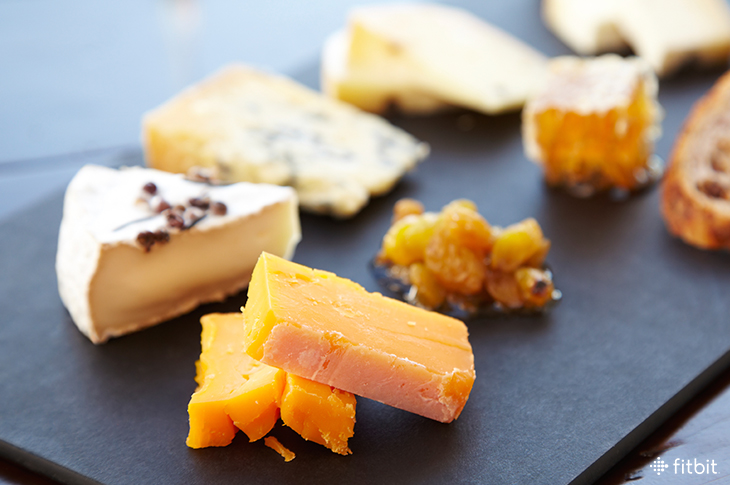
Cheese—guilty pleasure or part of a healthy diet? Experts fall on both sides of the fence, some praising the benefits of protein and calcium, others condemning high calories, saturated fat, and sodium. But no matter how you feel about it, you’re likely still nibbling away—Americans eat 34 pounds of cheese per person per year.
Cheese, Healthy Or Not?
Cheese does offer some nutritional benefits. “Cheese is absolutely a healthy source of protein, calcium, and good fats, as well as probiotics,” says Nina Planck, a food writer, farmers’ market entrepreneur, and “real food” advocate, who also happens to be married to Rob Kaufelt, owner of Murray’s in New York. “If you like stinky cheese, blue cheese, and washed rind cheeses, that’s a great way to get probiotics into your diet,” she says. A small study also links cheese with butyrate, a fatty acid, which reduces inflammation and wards off colon cancer. So in addition to being delicious, cheese might also be good for your gut.
Still, cheese is undeniably high in calories and fat. The American Heart Association continues to recommend limiting your intake of saturated fat, and that means animal fats, including cheese. (New research challenges the link between saturated fat and heart disease, and many experts are calling for an update. But the guideline hasn’t changed just yet.)
So it depends how you feel about fat. If you’re into whole foods, real food, or the Mediterranean diet, you might eat full-fat dairy to your heart’s (and gut’s) content. Of course, there are philosophical and health reasons for not eating cheese—if you’re strictly paleo, vegan, allergic, or intolerant, you probably already stopped reading.
Enjoy Cheese in Moderation
Fall somewhere between? Enjoy cheese in moderation. The USDA defines a serving as 1.5 oz (45 g), which is a good guideline per day when balanced alongside other saturated fats—if you buttered your toast at breakfast or plan to enjoy steak for dinner, you might consider snacking on something else.
Even if you’re into the real food philosophy, it’s still a good idea to show some restraint. Planck doesn’t limit how much cheese her family eats, but she also doesn’t eat mindlessly. “My kids eat all real food, ad libitum,” she explains, using a latin term for “according to one’s pleasure.” “But I encourage them to fill up on fresh fruit, veggies, and protein first.”
Healthy Ways to Eat Cheese
Here are a few fresh ways to make cheese part of a healthy diet:
- Folded into eggs: Stirred into a scramble or frittata, cheese gives eggs and veggies a flavor boost. Try dark, leafy greens and parmesan, or cherry tomatoes and fresh mozzarella.
- Sprinkled on salad: Feta, blue cheese, and chèvre are perfect for crumbling over mixed greens, sliced apples and pears, or chopped cucumber and tomato.
- On an open-face sandwich: Gruyère and Comté are champion melters. Stack whole-wheat bread with mushrooms, asparagus, or tuna, top with a slice of cheese, and toast until gooey.
- With veggies as a snack: Smash blue cheese or chèvre and stir into yogurt to make a quick dip. Serve it with raw carrots, celery, bell pepper, or sugar snap peas.
- Baked in a comforting casserole: Who can resist a golden crust? But instead of lasagna or ziti, get some veggies in the mix. Layer eggplant or zucchini with marinara, and top it off with a sprinkle of mozzarella or parmesan.
- With fruit for dessert: Whip up some part-skim ricotta and pile on berries, or simply pair figs and blue cheese, or apples and cheddar. A drizzle of honey harmonizes the flavors.
What’s your favorite kind of cheese? Join the conversation below.
This information is for educational purposes only and is not intended as a substitute for medical diagnosis or treatment. You should not use this information to diagnose or treat a health problem or condition. Always check with your doctor before changing your diet, altering your sleep habits, taking supplements, or starting a new fitness routine.

I like land of Lake cheese white